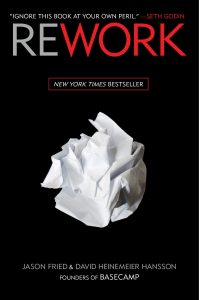
Lessons from Rework:
1. Learning from success is better than learning from mistakes:
- Certain things that work for others doesn’t mean they will work for you. Other peoples mistakes are not your mistakes.
- When you learn from your mistakes, you actually learn what not to do, but learning from success will guide you on what to do next.
- You don’t need to fail in order to achieve success.
2. Premature growth is bad for you:
- Growing for the sake of growing is meaningless. Understand your business and determine what fits best for it.
- Getting big will only increase the complexity of infrastructure. Once you grow big, getting leaner will become even harder.
3. Don’t plan too far ahead:
- Such plans will only permit you to operate in the past. Be quick and comfortable to switch up plans as times change.
- These types of plans only result in inaccurate executions and results.
- You have to learn to go in different directions as this is what’s suitable today.
- Gradually replace planning with the ability to improvise. This will be more beneficial.
4. Avoid workaholism:
- In reality, working too much is getting fewer things done. Why? Because working too much isn’t the same as working deep.
- Workaholics will only generate more problems than they solve. Such people do it to feel good. Not because it brings value by solving necessary problems.
- Work hard only when the circumstances require it. Not all the time.
5. Don’t give up too much control:
- There is no point in receiving more money to let someone else control your money.
- By accepting too much money from investors, you will only be obliged to do what they want.
- You won’t be able to leverage anything of value by doing so. Instead, first, start by focusing on building something truly great and viable.
6. Focus on the things you have:
- When your starting, don’t worry about barriers as they push you to be creative with the things you have with you.
- Learn to make the best out of the things that are essential for you and your business.
- Don’t try to solve a big problem by tackling it as a whole. Reduce to the core issue and begin from there. Learn to reduce and polish.
7. Small victories are good:
- Focus on small victories as these will pave the way to bigger success. One step at a time.
- Try to get instant feedback, suggestions. Get others on board.
8. Don’t listen to all the details:
- Each time you receive feedback, don’t be in a hurry to implement it. Instead, be patient. The most important questions will remain with you as they will be the loudest for the longest time.
- Test your ideas on a small scale first. This will ensure the viability of an idea and estimate its worth.
# Key Takeaways from Rework:
– Embrace the idea of “less is more” and focus on doing fewer things, but doing them exceptionally well.
– Don’t wait for the perfect moment or plan, just start and figure things out as you go.
– Avoid meetings and instead communicate through writing, which allows for more clarity and accountability.
– Hire for attitude and passion, not just skills and experience.
– Embrace constraints and limitations as they can lead to more creative solutions.
– Don’t be afraid to say no and prioritize what is truly important.
– Focus on creating a product or service that solves a problem and adds value to people’s lives.
– Embrace the idea of continuous improvement and constantly iterate and adapt.
# Practical Application of Rework Concepts:
– Prioritize tasks and focus on the most important ones, rather than trying to do everything at once.
– Use written communication to avoid misunderstandings and keep everyone on the same page.
– When hiring, look for candidates who align with the company’s values and have a strong work ethic, rather than just focusing on their skills and experience.
– Embrace limitations and use them as a catalyst for creativity and innovation.
– Continuously evaluate and improve processes and products to stay relevant and competitive.
# Valuable Insights for Leaders and Managers:
– Chapter 1: “Ignore the Real World”
– This chapter challenges traditional business norms and encourages leaders to think outside the box.
– Chapter 2: “Learning from Mistakes is Overrated”
– This chapter emphasizes the importance of taking action and learning from failures rather than being afraid to make mistakes.
– Chapter 3: “Planning is Guessing”
– This chapter encourages leaders to be adaptable and flexible, rather than sticking to rigid plans.
– Chapter 4: “Why Grow?”
– This chapter challenges the idea of constant growth and encourages leaders to focus on sustainability and profitability.
– Chapter 5: “Meetings are Toxic”
– This chapter offers alternative methods of communication and decision-making, rather than relying on time-consuming and often unproductive meetings.
# Effective Case Studies and Examples:
– The story of 37signals (now Basecamp) and how they built a successful business with a small team and limited resources.
– The example of Zappos and their unique company culture, which prioritizes customer service and employee happiness.
– The story of how the creators of 37signals developed their product, Basecamp, by focusing on solving their own problem rather than trying to appeal to a broad market.
– The example of how 37signals handled a major outage and communicated with their customers through a blog post, showcasing the power of written communication.
Leave a Reply